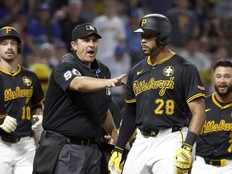McGill professors challenge Quebec over 'unconstitutional' anti-strike bill
Quebec’s new labour legislation “violates freedom of association,” the chief negotiator for the university’s law faculty says.

Article content
Multiple faculty associations at McGill University have filed a legal challenge against Quebec’s Bill 89, claiming it violates the constitutional right to strike.
The bill, adopted on May 29 and coming into effect in November, grants the province’s labour minister the power to intervene in strikes deemed to have a “disproportionate impact on the social, economic or environmental security of the population,” reads the filing submitted last week in Quebec Superior Court. The groups raise concerns about potential overreach.
Recommended Videos
“We’re saying that it violates freedom of association,” Richard Janda, secretary and chief negotiator for McGill’s law faculty, said in an interview Tuesday.
“It’s expanding well beyond safety, health, security, essential services, to cover basically any worker in Quebec” and putting an end to the right to strike, he added.
Barry Eidlin, a McGill sociology professor and expert in labour movements, says there has been an uptick in strike activity across Quebec in recent years, pointing to notable walkouts from paramedics, public transit workers and Amazon employees. While workers in some sectors already face strike limitations under the Quebec Essential Services Act, Eidlin says the new law significantly broadens the definition of essential workers.
“When people can’t get around, or they can’t get to a hospital appointment, or they can’t get into their school, there’s this natural reaction that people have like, ‘Oh, these are essential workers.’ And this is a healthy reaction, in the sense that it’s a recognition that the work that millions of workers do on a day-to-day basis is essential to the functioning of everyday society,” Eidlin said.
“Because it’s essential, I think that our response as a society should be, ‘Let’s figure out how to make sure that these workers who are doing this essential work are paid well and treated properly,’ not, ‘How do we write laws to force them to work against their will under conditions that are not of their choosing?’”
The faculty associations applying for the legal challenge include the Association of McGill Academic Staff of the School of Continuing Studies, McGill Association of Professors of the Faculty of Arts, Association of McGill Professors of Education and Association of McGill Professors of Law.
The new legislation will not apply to federal employees, who are covered under the Canada Labour Code. It can only be used for workers who fall under such Quebec jurisdictions as education and manufacturing, according to Eidlin.
While the federal Labour Ministry has issued several back-to-work orders in recent strikes involving Canada Post and port workers, Janda argues that the Quebec government is “going a step further” with Bill 89.
“This legislation allows the government to turn the decision into a simple bureaucratic process, where the minister can simply sign a decree without the debate and political consequences typically associated with back-to-work legislation,” he said.
Eidlin referred to government intervention in strikes as a “Canadian tradition,” saying it harmed workers during strikes in Quebec in the 1940s and 1970s, and pointed to more recent labour disruptions.
“It’s not something you see to nearly the same extent in other, similar countries, this sort of knee-jerk response” in ordering people back to work, he said.
The Gazette reached out to the Quebec’s Ministry of Labour, but they declined to comment while legal proceedings are underway.
Labour Minister Jean Boulet has defended Bill 89, saying something had to be done to better protect the public in the event of long labour conflicts.











Postmedia is committed to maintaining a lively but civil forum for discussion. Please keep comments relevant and respectful. Comments may take up to an hour to appear on the site. You will receive an email if there is a reply to your comment, an update to a thread you follow or if a user you follow comments. Visit our Community Guidelines for more information.